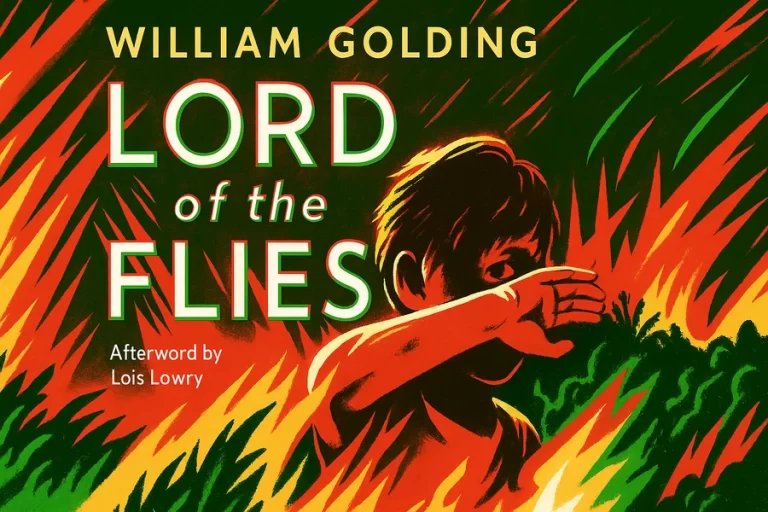Ray Bradbury’s Fahrenheit 451, first published in 1953, is more than just a dystopian novel about a world where books are banned and burned. It is a profound critique of censorship, conformity, and cultural decline.
While originally written in response to postwar fears of state control and mass media, its relevance has only deepened with time. Today, Fahrenheit 451 reads less like speculative fiction and more like a mirror—one that reflects many unsettling truths about our current society.
At the core of Bradbury’s work is the fear that people will not be forced into ignorance by tyrannical regimes but will choose ignorance themselves. Through themes of distraction, superficiality, and moral disengagement, the novel critiques societal trends that are strikingly visible today. From screen addiction to information overload and the erosion of meaningful discourse, Fahrenheit 451 presents a prophetic vision that continues to resonate.
The Dangers of Distraction
One of the most noticeable parallels between Bradbury’s imagined future and our contemporary world is the dominance of distraction. In the novel, citizens are bombarded with fast-moving, shallow entertainment on “parlor walls”—large, interactive TV screens that envelop entire rooms. These walls provide constant stimulation, discouraging reflection and replacing authentic relationships with artificial interactions.
In today’s society, the omnipresence of smartphones, streaming platforms, and social media creates a similar environment. People often scroll through endless feeds, jump from video to video, or binge-watch shows, not for enrichment but for escape. This culture of constant stimulation mirrors Bradbury’s concern that people will trade depth for ease, opting for entertainment that asks nothing of them.
Distraction in Fahrenheit 451 isn’t neutral—it’s a tool of control. It keeps people from thinking critically, asking questions, or resisting the status quo. In our own world, the overconsumption of media can have a similar numbing effect, diluting attention spans and reducing complex issues to viral soundbites.
Censorship by Choice
While Bradbury’s dystopia involves firemen who burn books, the deeper form of censorship in the novel is not imposed by the government—it is embraced by the public. Captain Beatty, the antagonist, explains that it was people’s desire for comfort and uniformity that led to the suppression of controversial ideas. Books weren’t outlawed overnight; they were abandoned because they made people uncomfortable.
In our era, overt censorship is less common in democratic societies, but a subtler form has taken hold: self-censorship. Social and cultural pressures discourage people from expressing unpopular opinions, particularly online. Fear of backlash, “cancel culture,” and public shaming leads many to silence themselves or avoid nuanced discussions altogether.
Bradbury’s warning is not just about burning books—it’s about the erosion of intellectual courage. When society prioritizes emotional comfort over truth, and consensus over complexity, it replicates the very conditions that allowed Bradbury’s world to come into being.
The Superficialization of Information
Another significant parallel lies in how Fahrenheit 451 presents information. In the book, society is flooded with trivia, slogans, and meaningless facts. People are encouraged to consume knowledge without context—memorizing data but never contemplating its implications.
Today’s internet culture can sometimes resemble this dystopia. While we have access to more information than ever before, it is often fragmented, decontextualized, or misleading. Algorithms prioritize engagement over accuracy, promoting content that provokes emotion rather than thought.
Bradbury feared a society where people would know “how” but not “why”—where knowledge would become shallow and weaponized. This is evident in the rise of misinformation and the decline of long-form, critical analysis in favor of hot takes and polarizing headlines. It’s not just about what we know, but how we process, discuss, and apply that knowledge.
Loss of Human Connection
In Fahrenheit 451, the protagonist Guy Montag lives in a world devoid of genuine connection. His wife, Mildred, is emotionally distant and obsessed with her television “family.” Conversations are superficial, and friendships are rare. Books, with their depth and emotional resonance, are seen as dangerous because they provoke empathy and introspection.
In modern life, digital communication can create similar disconnection. Texts replace conversations, social media interactions substitute for real companionship, and curated online personas obscure authenticity. Though we are more connected technologically, many people report feeling lonelier than ever.
Bradbury reminds us that books—real conversations, vulnerability, complexity—are antidotes to alienation. When we strip away the messiness of human emotion for the sake of efficiency or safety, we lose something vital: our shared humanity.
The Role of Technology in Shaping Reality
Technology in Fahrenheit 451 isn’t inherently evil; rather, it’s how people use it that determines its impact. The novel depicts a society that has allowed machines and media to define reality. From the mechanical hound to the immersive TV walls, technology creates comfort but also facilitates control.
In contemporary life, similar dynamics are at play. Technology shapes our worldview—what we read, believe, and feel. Algorithms determine the content we see. News feeds tailor reality to personal preferences. Virtual assistants and automated systems remove friction but also reduce autonomy.
Bradbury’s concern was not that technology would enslave us, but that we would willingly hand over control for the sake of ease. The real danger lies in allowing convenience to substitute for conscience and personalization to replace perspective.
Resisting the Fire: What Montag’s Journey Teaches Us
At its heart, Fahrenheit 451 is not just a cautionary tale—it’s also a story of awakening. Montag’s transformation from fireman to rebel reflects the possibility of resistance. He begins to question, to read, to think, and ultimately to act.
His journey is a call to reclaim agency. In today’s world, resisting the metaphorical fires—distraction, conformity, apathy—requires intentionality. It means seeking out long-form reading, engaging in difficult conversations, protecting spaces for critical thinking, and nurturing empathy.
Montag’s rebellion is quiet but powerful: he chooses to remember, to care, and to pass knowledge on. In doing so, he preserves the hope that culture can be rebuilt on a foundation of truth, imagination, and human connection.
Bradbury’s Enduring Message
Ray Bradbury’s Fahrenheit 451 continues to echo because it was never just about the future—it was about tendencies already present in society. The novel explores how entertainment, fear, and technological ease can undermine critical thought and isolate individuals. Its genius lies in diagnosing how a culture might collapse—not with violence, but with silence.
Today, the fires that threaten our world are not literal flames, but distractions that dim our awareness, ideologies that flatten complexity, and comforts that seduce us into disengagement. Bradbury’s message is both a warning and an invitation: to read deeply, question honestly, and connect meaningfully.
The real fireman’s job, perhaps, is not to burn—but to illuminate.



